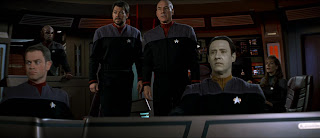Written by Ronald D. Moore and Brannon Braga
Directed by Jonathan Frakes
 |
| Everyone knows where to look except Worf, apparently. |
Though "Star Trek: Generations" was fairly hit-or-miss, "First Contact" presents a far more focused, well-crafted experience. Something of a sequel to a storyline that had run though the "Next Generation" TV series, "First Contact" brings back the most popular villain that show had given rise to: the Borg.
Now captain of the new Enterprise-E, Jean-Luc Picard (Patrick Stewart) is suffering from nightmares about his experiences aboard the Borg ship six years prior (chronicled in the excellent "Best of Both Worlds" two-parter). It turns out these are not normal nightmares, however: the Borg have once again invaded Federation space, headed directly for Earth (as so many "Star Trek" feature film threats seem to...)
But instead of being ordered to join the fight, the crew is shocked to learn that the Enterprise has been sidelined to patrol the Neutral Zone. When news of the battle turns sour, Picard defies orders and takes the ship to Earth, using his unique ability to sense the Borg consciousness to turn the tide of battle. Just when they think they've won, however, the Borg throw a desperate curveball: an escape vessel creates a time rift and travels to the past, where Earth is unable to put up a fight against them. Picard and his crew manage to take their ship back in time as well. Stranded in the past, they realize the Borg plan was to disrupt First Contact - the historic meeting between humans and aliens for the first time.
On the planet's surface, the crew discovers Zefram Cochrane (James Cromwell) inventor of the warp drive. But he is not as history paints him. Instead, he's a drunken womanizer who, after the Borg attack damages his vessel, is more than willing to give up on attempting humanity's first faster-than-light spaceflight. Meanwhile, it seems the Borg have managed to infiltrate the Enterprise. While Picard battles his old nemesis through the corridors of his ship, Riker (Jonathan Frakes) must work on convincing Cochrane to make his historic flight in time to save the future.
"Star Trek: First Contact" is easily the best of the four "Next Generation" movies. Like Leonard Nimoy before him, cast member Jonathan Frakes managed to wrangle directing duties on this entry (though he at least had the benefit of having directed some of the television episodes prior) and manages to do quite a bang up job. Of course, Frakes would never again manage to direct anything as good as "First Contact" and now makes a living teaching directing and managing a furniture store in Maine (with the occasional TV directing gig). Anyway, Frakes gets good performances out of his stellar cast, constructs moody atmosphere aboard the Borg-assimilated Enterprise, and throws in some excellent action sequences to boot. The pacing of the film is spot-on, as well, with no single sequence outliving its welcome before we move on to the next. Alternating back and forth between the Earth-bound storyline and the ship-board adventures works well at keeping things fresh.
Like "The Undiscovered Country," some fans have taken issue with the level of thematic darkness in the film. Picard, often portrayed as an almost infallible moral authority, here finds himself succumbing to very human desires for vengeance. Some of this material had been covered in earlier episodes of the TV series, but it had become obvious that Picard would never truly recover from the wounds inflicted on him.
The Borg Queen (Alice Krige) is also a source of some controversy. Previously, the Borg had always been depicted as a pure collective consciousness, and yet here they have a decisive leader, and one who exudes a creepy sexuality. Personally, I've never had a problem with this character. She fills a certain dramatic role in the film, to give the villains a focus for the audience, especially those who are less familiar with the TV series. Plus, it's hard to fault Krige's extraordinarily creepy performance, and an awesome makeup job, as well.
The Borg themselves get a big-budget makeover. No longer actors painted white with some tubes and plastic bits sticking out of black unitards, the Borg are far more detailed and frightening here. And of course, the best part of having a movie franchise and a TV franchise running at the same time is that you get to share things between them; the new Borg makeup and sets would appear throughout the rest of "Star Trek: Voyager." (This very movie would also get a specific sequel episode in the prequel series "Star Trek: Enterprise" which creates a sort of interesting time-loop for the entire Borg storyline.)
Jerry Goldsmith delivers another excellent score, bringing back notable motifs from his previous entries, like the Enterprise theme and the Klingon theme now used solely for Lt. Commander Worf (Michael Dorn).
On blu-ray, this movie looks way better than any of the previous ones (and frankly, some of the subsequent ones). Sharp details and excellent color are the name of the game here, and it's the best-looking "Trek" flick thus far. It exhibits some of the digital noise reduction issues that plagued earlier movies, but not nearly as much. Hell, you can see the spots on Patrick Stewart's skull, here. If this movie could look better, it wouldn't be by much.
No comments:
Post a Comment